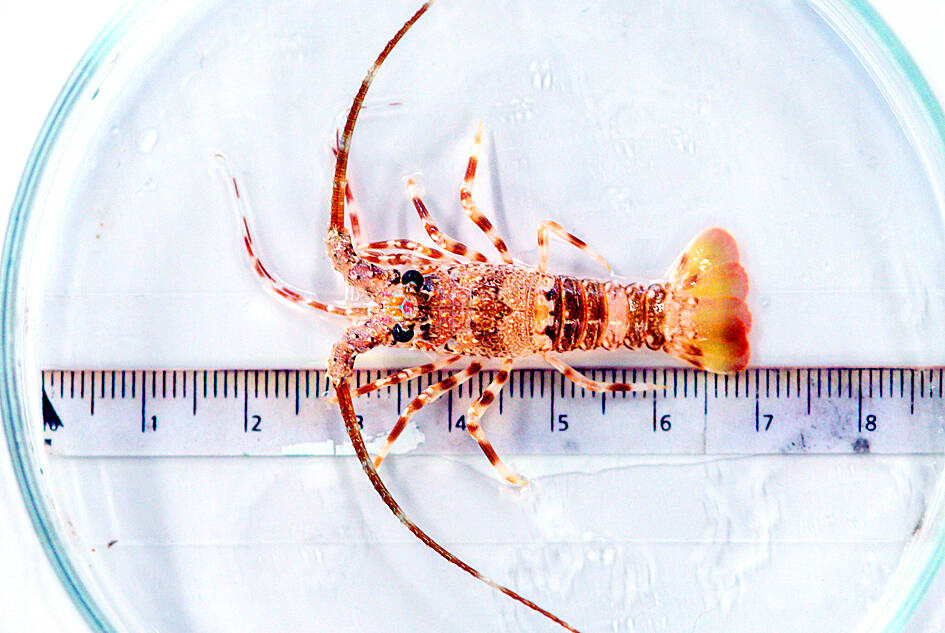Taiwanese aquaculture researchers have raised the survival rate of lobster hatchlings from 40 percent to 70 percent, the Council of Agriculture’s Taitung District Agricultural Research and Extension Station said.
The station unveiled the breakthrough at a trade convention in November last year.
Lobster spawns molt several times in the six months following hatching to reach the postlarvae stage, said Cheng Ming-chung (鄭明忠), an assistant researcher with the Fisheries Research Institute’s Eastern Marine Biology Research Center.

Photo courtesy of Cheng Ming-chung
Postlarvae are highly sensitive to water quality and fluctuations in environmental factors, and regularly engage in cannibalism, which makes keeping them alive a technical challenge for lobster farms, said Cheng, who led the project to improve lobster farming techniques.
Taiwanese lobster farms typically import 2cm-long postlarvae harvested from the sea and raise them into 4cm-long juveniles, he said.
The research team solved the issue of cannibalism by introducing shrimp larvae into the pool for the postlarvae to hunt, while large clumps of kelp provided hiding places, he said, adding that new technologies were used to improve the regulation of water and feed quality.
The techniques could help farmers raise more lobsters from the same larvae stock, and improve the flavor of the tomalley and the firmness of the meat, Cheng said.
The researchers used the species Panulirus homarus and Panulirus ornatus in the study, with the former being the more readily available and economic option for Taiwanese lobster farms, he said.
Using the new methods, the Panulirus homarus could grow from 2cm-long prolarvae to 4cm-5cm juveniles in two months, Cheng said, adding that the juveniles could then be transferred to downstream farms specializing in growing adults.
Juveniles can grow into market-ready adults weighing 250g to 300g in eight months, he added.
The Council of Agriculture has unveiled a policy to encourage the use of solar panels on lobster farms with indoor pools, to ensure a stable power supply and water salinity levels at the farms, center director Ho Yuan-hsing (何源興) said.
Open-air lobster farms are prone to drops in water salinity due to power outages or human error, which could lead to larvae deaths, he said, adding that lobsters are nocturnal animals and thrive in roofed pools.
Improved aquafarming techniques can reduce the nation’s reliance on imports and the impact of lobster fishing on nature, he said.
Representatives from the solar energy and aquafarming sectors have expressed an interest in working together, he added.

Alain Robert, known as the "French Spider-Man," praised Alex Honnold as exceptionally well-prepared after the US climber completed a free solo ascent of Taipei 101 yesterday. Robert said Honnold's ascent of the 508m-tall skyscraper in just more than one-and-a-half hours without using safety ropes or equipment was a remarkable achievement. "This is my life," he said in an interview conducted in French, adding that he liked the feeling of being "on the edge of danger." The 63-year-old Frenchman climbed Taipei 101 using ropes in December 2004, taking about four hours to reach the top. On a one-to-10 scale of difficulty, Robert said Taipei 101

Nipah virus infection is to be officially listed as a category 5 notifiable infectious disease in Taiwan in March, while clinical treatment guidelines are being formulated, the Centers for Disease Control (CDC) said yesterday. With Nipah infections being reported in other countries and considering its relatively high fatality rate, the centers on Jan. 16 announced that it would be listed as a notifiable infectious disease to bolster the nation’s systematic early warning system and increase public awareness, the CDC said. Bangladesh reported four fatal cases last year in separate districts, with three linked to raw date palm sap consumption, CDC Epidemic Intelligence

Two Taiwanese prosecutors were questioned by Chinese security personnel at their hotel during a trip to China’s Henan Province this month, the Mainland Affairs Council (MAC) said yesterday. The officers had personal information on the prosecutors, including “when they were assigned to their posts, their work locations and job titles,” MAC Deputy Minister and spokesman Liang Wen-chieh (梁文傑) said. On top of asking about their agencies and positions, the officers also questioned the prosecutors about the Cross-Strait Joint Crime-Fighting and Judicial Mutual Assistance Agreement, a pact that serves as the framework for Taiwan-China cooperation on combating crime and providing judicial assistance, Liang

US climber Alex Honnold left Taiwan this morning a day after completing a free-solo ascent of Taipei 101, a feat that drew cheers from onlookers and gained widespread international attention. Honnold yesterday scaled the 101-story skyscraper without a rope or safety harness. The climb — the highest urban free-solo ascent ever attempted — took just more than 90 minutes and was streamed live on Netflix. It was covered by major international news outlets including CNN, the New York Times, the Guardian and the Wall Street Journal. As Honnold prepared to leave Taiwan today, he attracted a crowd when he and his wife, Sanni,